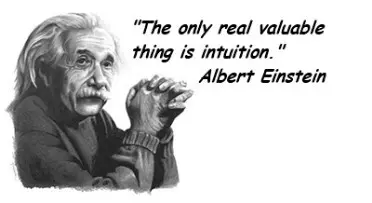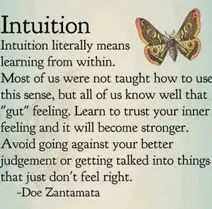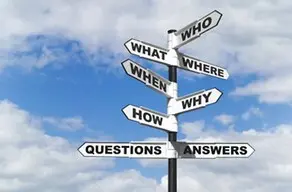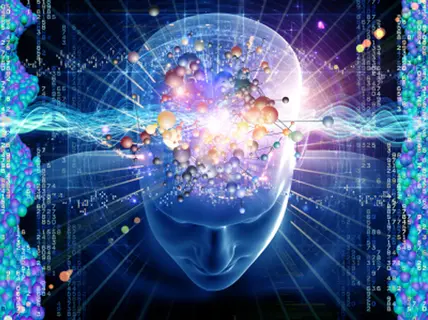What is Intuition?
The standard definition is "knowledge gained of something without the use of reasoning or the five basic senses". Throughout time, many of the great achievers have spoken of successful decisions they made based on hunches, insights, visions, and gut feelings.
Are You Intuitive?
We have all had experiences involving intuition. A common occurrence is to think of someone we have not seen or heard from in a while and then shortly afterwards, out of nowhere, this person shows up in our lives. Many of us have dreams while sleeping and then shortly afterwards find ourselves in the same specific situation in our waking reality.
Another common experience happens when we are walking, for example at a shopping mall, and we feel a pull to look in a certain direction out of our field of vision. Then it happens - we turn and lock eyes with someone who was admiring us from a distance. Of course, they often look away quickly when they realize they are intuitively caught. It's hard to play a situation like that off on biological factors (scents, sounds, etc.), especially when the other person is a hundred feet away.
What Are The Benefits Of Intuition?
As we begin to rely on this unified aspect and become more receptive to information received intuitively, we advance mentally, emotionally, and spiritually at a much faster rate compared to an individual who limits himself/herself to just information obtained from the five senses. This applies to every aspect of our lives (relationships, family, finances, awareness, happiness, etc).
There is a bank of greater intelligence that is accessible to everyone. This intelligence exceeds far beyond our limited personal reasoning. An example of the benefits of utilizing this greater intelligence could be a situation that occurs commonly in intimate relationships. Say for example, that an individual becomes jealous of their partner and they cannot figure out why or what to do to make the jealousy go away. By being receptive to intuition, to this greater intelligence, they not only have a greater probability of seeing the reason that they are jealous, but also a greater chance at coming up with a solution to the issue. Most of us could probably appreciate that.
That is much more efficient than repeating the same pattern of being jealous until it finally tears the relationship apart and then finding ourselves once again in a new relationship in a similar situation.
Communication With Others
Greater communication with yourself as well as greater communication with others can occur as you become more open to intuitive insights. The potentials are very appealing. Imagine being able to look at someone and know instantly where they stand:
How they really feel, not just how they appear to feel
What the reason behind their emotion is
What they have been through in life
What their challenges are
What their talents are
What they are attempting to communicate with you
Imagine specifically knowing when you need to telephone someone that you care about that needs support. Imagine knowing the most appropriate thing to say to someone that you are talking to – even someone you just met for the first time. You can start to see the intensity of the intimacy that is reachable with others and how meaningful heightened intuition can be in your life.
If things generally seem to work out smoothly in your life, you probably already function intuitively well (although you might not recognize the intuitive experiences when they occur). If this is the case, you might not need to put that much attention on this aspect of life we call intuition. We should point out at the same time that "functioning well" is a relative term. If you compare yourself to one of the great achievers of our times, you might see how you could be more creative, successful, and aware.
On the other hand, if you just keep making decisions that seem to create undesirable effects, you might want to consider trying something different. There may be a way of functioning in which much of the suffering you are going through can be bypassed.
Some Elements Involved With Intuition
We all have random experiences of intuition, but to actually induce this type of experience, to call forth this higher level of intelligence at will, it may take a little more practice for a lot of us. Based on research from field-studies conducted by Princeton University and other credible sources, in order to access intuition, many of us will have to develop:
- The skill of being quiet mentally and emotionally so that there is actually room to listen
- A less limiting model of reality which actually allows the ability of the mind to perceptually skip across time and space
- An openness to the outcome (play with intuition like a game)
- Concentration
- Open-mindedness about life (when we are biased, we tend to block intuition)
- The ability to overcome our fears, doubts, our limited perceptions from past conditionings
- The boldness to take small risks, more and more
- Receptivity to receiving intuitive information
- The ability to focus our attention intensely
- The ability to pay attention (perceiving from an advanced level of awareness)
In your pursuit for the experience of intuition, you discover ways to open yourself up to this unlimited insight. One of the most effective paths is to just have fun with it, play with it. You will be much more successful if you play with intuition instead of working hard at it. Many of the great thinkers throughout time would agree that every aspect of life is more enjoyable if you are operating from the "playground of your mind."
Developing Heightened Perception
Paying attention is one of the simplest ways for you to start to become more open to receiving intuitive insights. When we say paying attention, we mean stepping back and seeing everything from a distance. When you are a fish, it’s tricky to get a greater understanding of what the water is unless you jump out of the water occasionally. If you think about it, a fish that jumps every now and then, has to perceive the underwater life a little different from the rest of those guys.
Anyway, you can apply paying attention in many ways. When you have a thought, instead of just thinking it and then reacting to it, step back and watch it go by, like a line of words on a blank movie screen or maybe a bubble floating by. This allows you to begin to perceive at a higher level instead of just "being thought".
Like an artist that is painting a huge painting - when the artist is up close to the painting, it is difficult for the artist to see anything except what is right in front of his/her face. When the artist steps back ten feet, it then becomes possible for him/her to perceive the painting for what it is, to see the whole painting / product.
Another excellent time to play this game of "paying attention" is when you have an emotion. Step outside of it and take a look at it. Observe where the sensation is within your body. What shape is it? If you had to give to a temperature, would it be hot or cold? Is it dense or spread out? Where does it exist in relation to the rest of your body or the room you are sitting in?
You have to play with these games of paying attention in the same way that a little toddler plays with a new toy. The toddler doesn't think a whole lot about it - he hasn't even learned how to think yet. He is more joyful, creative, and open to discovering the toy for what it is. There is actually no "him" that is playing with the toy. "He" (the conditioned, programmed intellect) does not even exist yet. It is more like "the experience of the toy" for the toddler. The toddler probably has little memory of the toy, just an encounter of the toy in the "present" moment.
It is in this space beyond your thoughts (or better yet, in between them), the space beyond your emotions, beyond the boundaries of your body, that a greater awareness of who you are lies. It is also in this space that the gifts of intuition exist. You may receive a passing thought out of nowhere, an emotional sensation, or image of something. This is how the intuitive process begins.






